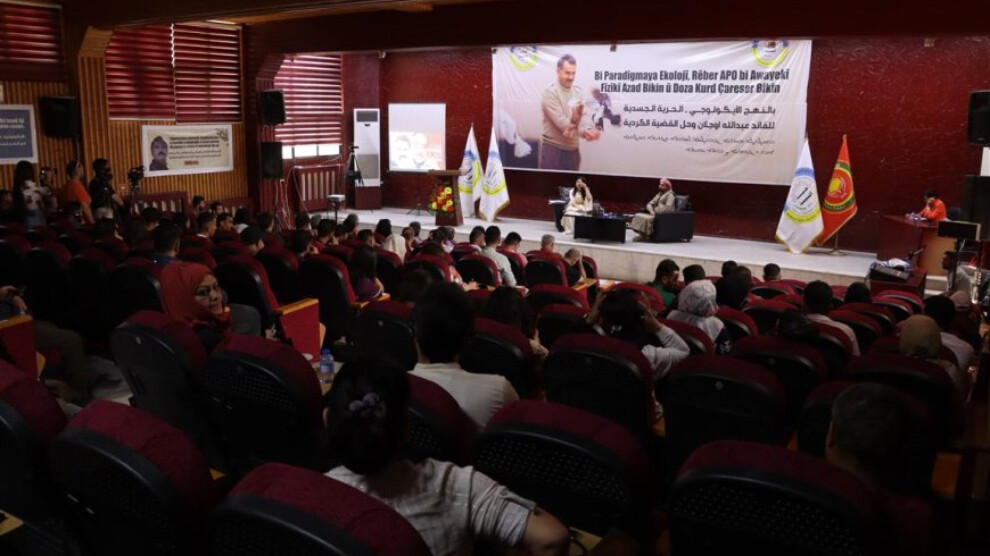Ecology Conference in Qamishlo discusses the ecological destruction in Kurdistan
The third session of the Ecology Conference in Qamishlo focused on ecological destruction in Kurdistan caused by the invasion attacks of the Turkish state.
The third session of the Ecology Conference in Qamishlo focused on ecological destruction in Kurdistan caused by the invasion attacks of the Turkish state.

Alongside grassroots democracy and women's freedom, social ecology is one of the pillars of the Rojava revolution, which is based on the paradigm of Abdullah Öcalan. The Ecology Council of the Democratic Autonomous Administration in the North and East Syria Region (DAANES) is holding its first conference at the University of Rojava in Qamişlo. The two-day conference, which started on Friday, is attended by 120 delegates from the Autonomous Administration, civil society organisations and political parties.
The conference addresses the topics of "Ecology in democratic modernity", "Conducting ecological struggle alongside the struggle against capitalism and colonialism", "Developing ecological agricultural culture as part of ending the occupation in Northern and Eastern Syria" and "Solidarity between institutions and organisations in Northern and Eastern Syria".
On the second day of the conference, Prof. Dr. Bengi Akbulut, Lecturer at the Department of Geography, Planning and Environment at Concordia University, made evaluations via Zoom about the ecological destruction experienced in Northern Kurdistan (South-East Turkey) after the AKP came to power.
Stating that the underground riches of Kurdistan were plundered, forests were burnt and ecological destruction is still continuing, Akbulut said that the occupying Turkish state aims to make the villages uninhabitable by cutting off the people's connection with the land in Kurdistan.
Pointing out that the Turkish state is carrying out a policy of genocide against the Kurdistan geography, Bengi Akbulut stated that there should be solidarity between the peoples at the international level.
Prof. Dr. Mehmûd Patîl, an international law expert, made evaluations on the ecological economy and the Democratic Modernity system presented by Kurdish Leader Abdullah Öcalan, who developed solutions to social, ecological and humanitarian problems against the policies of the capitalist system.
Mehmûd Patîl stated that the basis of Democratic Modernity is democracy as an alternative to nationalism. Remarking that capitalist modernity aggravates ecological problems, Mehmûd Patîl said, "As a result of the spread of capitalist modernity, the environment has been and continues to be destroyed. Democratic Modernity, on the other hand, protects ecology, the environment and stops migration. Therefore, the alternative to capitalist modernity is Democratic Modernity. On this basis, Leader Abdullah Öcalan clearly offers solutions."
Mehmûd Patîl said that the only solution against over-industrialisation is to spread ecology and agricultural society starting from the villages and added: "If the philosophy of Leader Abdullah Öcalan is put into practice, destruction can be prevented. Unemployment, poverty and hunger can also be prevented. If we overcome these obstacles, then we can create a politically and socially knowledgeable society in accordance with social norms. Then, the people will win."
Environmental Scientist Ercan Ayboğa said that the Turkish state uses nature as a tool in its attacks against the Kurdish people. Ayboğa stated that the Turkish state has signed many agreements and built many dams on big rivers such as Munzur and Zap, and prevented the water from reaching Syria and Iraq, causing a water crisis.
Dr Lena Eklund, an expert in geography, and Pınar Dink, a researcher in ecology, talked about how the nature of Kurdistan is being destroyed by the occupying Turkish state and how forests are being burned during military attacks.
Dr Marcin Skupiński, an expert in Humanities at the University of Warsaw, drew attention to climate change and its effects on people's lives in Northern and Eastern Syria, noting that the region has a very important paradigm for the future.
Marcin Skupiński drew attention to the fact that the Turkish state is destroying the infrastructure of North-East Syria, using water as a weapon against the people of the region. Skupiński noted that Turkey’s attacks are linked to exploitation plans, and that its aim is to destroy the democratic nation project.
The conference continues with new agenda items.